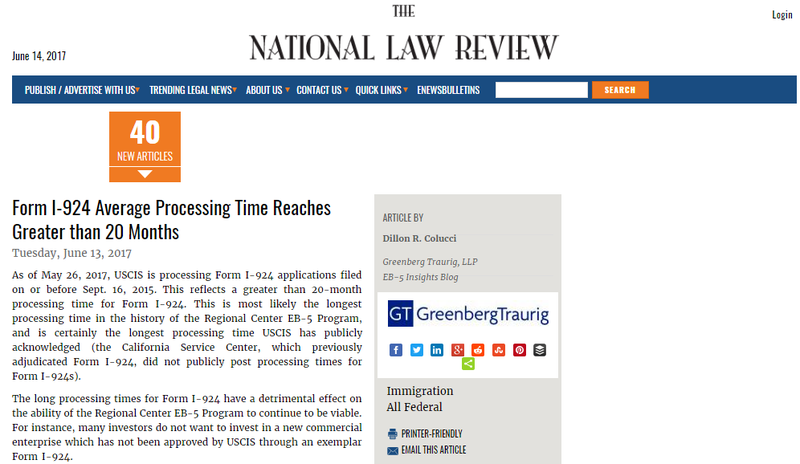Form I-924 Average Processing Time Reaches Greater than 20 Months
As of May 26, 2017, USCIS is processing Form I-924 applications filed on or before Sept. 16, 2015. This reflects a greater than 20-month processing time for Form I-924. This is most likely the longest processing time in the history of the Regional Center EB-5 Program, and is certainly the longest processing time USCIS has publicly acknowledged (the California Service Center, which previously adjudicated Form I-924, did not publicly post processing times for Form I-924s).
The long processing times for Form I-924 have a detrimental effect on the ability of the Regional Center EB-5 Program to continue to be viable. For instance, many investors do not want to invest in a new commercial enterprise which has not been approved by USCIS through an exemplar Form I-924. However, in order to be eligible to receive approval of an exemplar Form I-924, the application must include more details than a hypothetical or actual project, and the project itself must be “shovel ready.” In order for a project to be “shovel ready,” the project typically has to be ready to proceed with substantial construction at the time of filing the exemplar Form I-924. One way to demonstrate this is to show that all financing (save for the EB-5 financing) is in place and all permits necessary for the project to move forward have been secured.
Therein lies the tension between USCIS’ processing times and the standards of approvability for an exemplar Form I-924. If it takes over 20 months for an exemplar Form I-924 to be approved, and the project was ready to be constructed at the time of filing, the project may be fully constructed by the time the exemplar Form I-924 is finally approved. This is a big issue for projects which require EB-5 financing to be completed. If receipt of that EB-5 financing is contingent upon the approval of the exemplar Form I-924 (or approval of a Form I-526, which takes longer to process than an exemplar Form I-924), the project likely will not be able to move forward until such approval is received. However, USCIS, during its adjudication of the exemplar Form I-924, will likely issue a request for evidence on why the initial timeline for the project has not been met. Thus, these projects are stuck in a catch-22 where USCIS wants to see timelines adhered to which are contingent on receipt of EB-5 financing. Additionally, in the past two years legislation has been proposed to mandate approval of an exemplar Form I-924 prior to soliciting capital from investors or filing a Form I-526. The current Form I-924 processing times make clear this is an unworkable standard.
The current solution to this issue is the procurement of bridge financing sufficient to allow the project to proceed on an interim basis until USCIS adjudicates the exemplar Form I-924. If bridge financing cannot be obtained, the project and its investors may suffer as a result of USCIS’ increasing processing times.
Mentions
States
- New York
Videos





Subscribe for News
Site Digest
Join Professionals on EB5Projects.com →
Securities Disclaimer
This website is for informational purposes only and does not constitute an offer or solicitation to sell shares or securities. Any such offer or solicitation will be made only by means of an investment's confidential Offering Memorandum and in accordance with the terms of all applicable securities and other laws. This website does not constitute or form part of, and should not be construed as, any offer for sale or subscription of, or any invitation to offer to buy or subscribe for, any securities, nor should it or any part of it form the basis of, or be relied on in any connection with, any contract or commitment whatsoever. EB5Projects.com LLC and its affiliates expressly disclaim any and all responsibility for any direct or consequential loss or damage of any kind whatsoever arising directly or indirectly from: (i) reliance on any information contained in the website, (ii) any error, omission or inaccuracy in any such information or (iii) any action resulting therefrom.



